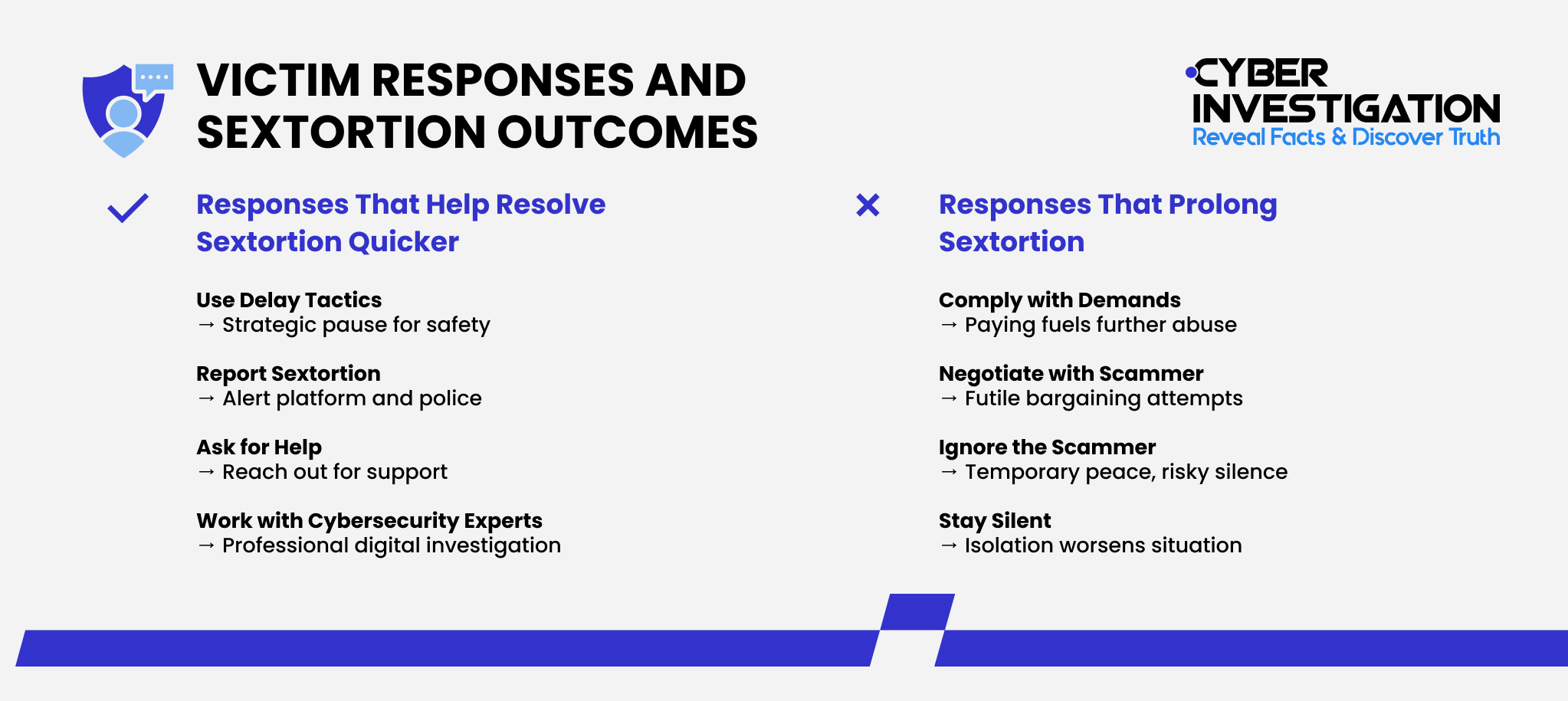When you read a sextortion message, it can make it appear like time has frozen. The emotional distress can seem unrelenting, and it may feel like this situation will never pass. But could this actually happen? Could sextortion truly go on forever? The length of a sextortion scam depends on many factors, but the biggest variable at play is the victim’s response. Read on to learn more about how long sextortion lasts.
How Does Sextortion Transpire?
If you clicked on this article, you probably already know the details of a sextortion scheme. Rather than wasting time breaking down sextortion, let’s focus on the factors that impact the length of the abuse.
Sextortion scams vary in the personalization toward their victims. Some perpetrators rapid-fire the same message to numerous targets at once. In other cases, sextortionists will spend extensive time and effort to study one target and socially engineer them into compliance.
This research often begins far before initial contact is even made and can continue far into communication. The sextortionist may take their time to appeal to their targets interests and build their trust before introducing sexual themes to the conversation.
After this point, the length of the scam becomes heavily dependent on the response of the victim. Compliance will only elongate the suffering. Ignoring them may bring moments of fleeting peace but will not be serviceable as a long-term solution. So, what can you do?


How Victims’ Responses Impact Sextortion Duration
Unfortunately, there’s no fool-proof way to deal with sextortion. The perpetrators of the crime are unhinged and unpredictable. They often make rash decisions when they feel cornered, and there’s no level they won’t stoop to for their payout.
However, there are strategies that have proven successful in the past. Likewise, there are responses that historically make matters worse. With minimal time to plan your next steps, it’s important to know what to do. Here are some of our experts’ suggestions to expedite the process, as well as some responses they advise you to avoid.
Responses That Can Help Resolve Sextortion Quicker
- Using delay tactics. This may sound counterintuitive to speeding up the process. However, sometimes you need a chance to step back before you can move forward. Delay tactics can help you buy time while you assess the situation and get the help you need.
- Reporting sextortion. Reporting to the authorities is important for holding these criminals accountable and making the internet a safer space. You should inform the platform so they can take action against the account responsible. Additionally, notify law enforcement to help them track cybercrime trends and open the door to legal action.
- Asking for help. Not talking to someone is the worst mistake a victim can make. Sextortion is extremely difficult — if not impossible — to handle alone. Talk with family or friends about what is going on. This can also help raise their awareness of this growing crime. There are also professional support networks you can reach out to.
- Working with cybersecurity experts. These experts can help you uncover evidence that you wouldn’t have access to alone. They can collect and analyze metadata within your interactions that point back to the criminal’s identity and location. This information will be critical when taking legal action against the perpetrator.
Responses That Can Prolong Sextortion
- Complying with the sextortionist. You should never go along with a sextortionists demands for money or further content. They may claim they will stop their attack if you pay them, but why would you take them at their word. Numerous studies have found that more than a quarter of victims who pay their sextortionist are met with further demands.
- Negotiating with the sextortionist. Much like compliance, negotiation will likely get you nowhere. Sextortionists are not rational-thinking individuals, so negotiation efforts are almost always futile. Even if you manage to talk them down, they still possess your content, and nothing is stopping them from returning.
- Ignoring the sextortionist. Like we said, this may temporarily put your mind at ease. Out of sight, out of mind, right? Well, not exactly. Ignoring the sextortionist will leave you in the dark about the progression of your case. It can also lead to retaliatory action from the perpetrator.
- Staying silent. Like we said above, silence is your worst option. The sextortionist wants you to feel isolated — to believe you have no option but compliance. Talking with your support group can help you navigate the emotional turmoil of the situation.
How Long Does the Harassment Last?
There’s no definitive answer to how long a sextortion case can last. It could be as short as a few hours, as long as numerous years, and anywhere in between. Many sextortionists are operating within an organized crime group. These individuals are looking to profit and will likely move on to the next target if they believe they won’t convince their current one to pay.
However, some sextortionists have a personal connection to their victims. They might know the person in real life or develop a stalker’s obsession toward them online. These sextortionists are especially dangerous because their motives extend past money. This often leads them to act more irrationally and take further measures to torment their targets.
Real-World Case: Amanda Todd’s Multi-Year Battle
Amanda Todd became a face of the global cyberbullying crisis when she posted her story to YouTube in 2012. What was lesser known at the time is that Todd was a victim of sexploitation, a type of blackmail that is very similar to sextortion. The difference being that instead of money, the perpetrator demanded further sexual content.
Todd was only in the seventh grade when the attack began. She had recently moved to live with her father and was looking to make new friends online. She joined an anonymous online chat service, where she was groomed by strangers. One of which was Aydin Coban, who repeatedly asked Todd to expose herself on camera for over a year.
Once the minor finally complied, Coban began blackmailing her. He had captured the video chat and threatened to expose the content to Todd’s friends and family if she didn’t “give him a show.” This began a series of similar interactions that lasted from 2009 through 2012.
After years of online abuse followed her across multiple schools, Todd made the tragic decision to take her own life on October 10th, 2012. It would take another decade to connect the crimes back to Coban. He was sentenced to 13 years in prison on October 14th, 2022.
How to Deal with Sextortion Quickly and Effectively
We have seen cases where blackmailers have come back with threats after weeks, months, and even years later claiming they still have their victim’s content and need money to put an end to it. These suspects will always have your content at hand, ready to use it against you when it’s convenient to them. This is why it’s so important to handle the matter in a prompt and informed fashion. Here’s a quick recap of our experts’ suggestions.
- Do not comply any further or pay the sextortionist.
- Document evidence of the crime, including account names, threatening messages, and timestamps.
- Report the sextortionist to the online platform and law enforcement.
- Make sure to get help with your emotional battle, not just the legal one.
And if you find yourself stuck in a sextortion scam that seems never-ending, Cyber Investigation Inc. is here to help. You can contact our Sextortion Helpline 24/7 to connect with one of our specialists and put an end to the sextortion for good.







